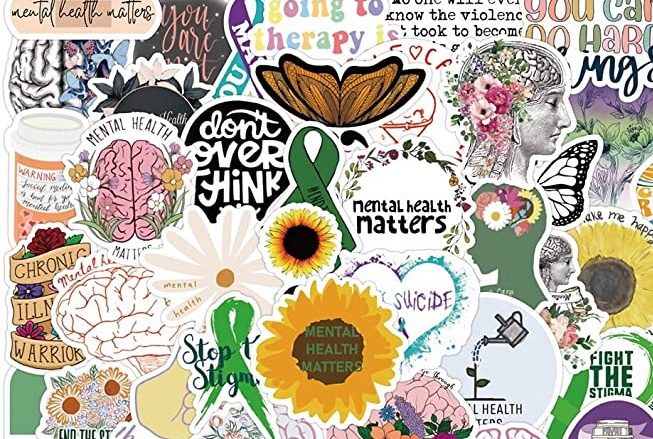May 1, 2023
Support, educate or advocate this mental health awareness month

Mental health awareness month offers the opportunity to refocus on self-care, acknowledge the importance of mental health and honor the courage of millions of people living with mental health conditions.
Mental health month has been observed in the U.S. since 1949 to raise awareness about mental health, fight stigma and advocate for policies that support the millions of Americans who are affected by mental illness. Read the 2023 Presidential Proclamation on National Mental Health Awareness.
Many people prioritize their physical health, but mental health is equally important for holistic wellness. In fact, mental and physical health are inexorably intertwined. According to the CDC, untreated mental health issues like depression can increase the risk for long term physical health issues like heart disease, stroke, and diabetes. The World Health Organization reports depression as one of the leading causes for disability and suicide as the second leading cause of death for 15-29-year-olds.
The first week of May is also Maternal Mental Health Awareness Week
Some 50% of Americans will be diagnosed with a mental illness or disorder at some point in their lives. Fewer than half of them will receive treatment for it.
 For 2023, the National Alliance on Mental Illness (NAMI) is organizing the #MoreThanEnough campaign, an intentional reminder of the inherent value of each person’s life–regardless of any diagnosis or other characteristic of our identity. Find social media templates, volunteer opportunities, upcoming events and more at their website.
For 2023, the National Alliance on Mental Illness (NAMI) is organizing the #MoreThanEnough campaign, an intentional reminder of the inherent value of each person’s life–regardless of any diagnosis or other characteristic of our identity. Find social media templates, volunteer opportunities, upcoming events and more at their website.
This month, take some time to prioritize your mental health:
- Take care of your body: get enough sleep, eat right, and stay active.
- Connect with others: talk to trusted people in your life about how you are feeling.
- Take time to unwind: carve out time for destressing by forest bathing, reading, coloring, doing yoga, meditation, breathwork or prayer, or other forms of self-care.
- Honor yourself by recognizing the struggles you face as legitimate.
Learn more
- Read: Mental Health Awareness Month: Youth Anxiety Skyrockets in “Generation Covid”
- Read: Dr. Pamela Collins: A champion of global mental health advocacy
- Explore: Art for Self-Care and Mental Health
- Understand: Suicide Prevention: Know the Warning Signs to Save Lives
Resources for BIPOC communities
This list of resources from Massachusetts General Hospital may be useful to BIPOC-identifying individuals seeking support for mental health concerns and/or coping with race-related stressors, whether current or historical.
44 Mental Health Resources for Black People: List of resources including links to influential thinkers and organizations focused on mental health in Black communities, directories for Black mental health practitioners, and helpful tips for seeking support.
Native and Indigenous people in America report experiencing serious psychological distress 2.5 times more than the general population over a month’s time. Check out:
- We R Native: Library of resources for Native and indigenous youth with practical strategies for building resilience, coping with diverse mental health challenges, and seeking help and support
- Native & Indigenous Peoples Addiction & Mental Health Support from Live Another Day: List of resources to support Native and indigenous mental health with a focus on suicide prevention and substance use
- StrongHearts Native Helpline (1-844-762-8483) is a confidential and anonymous culturally appropriate domestic violence and dating violence helpline for Native Americans, available every day from 7 a.m. to 10 p.m.
Are you or someone you know in crisis? Call the 988 Suicide and Crisis Lifeline 24/7 to speak to a counselor, including those trained to support LGBTQ+ youth and veterans.
Support
Consider making a one-time contribution or setting up payroll deduction to one of our CFD member organizations working to provide quality mental heath services and destigmatize seeking care:
Born this Way Foundation (Charity Code 1482977): supports the mental health of young people and works to create a kinder braver world through high impact programming, youth led conversations, and strategic partnerships.
Bridgeways (Charity Code 1478773): offers services that promote quality of life for individuals living with mental illness in a manner that facilitates growth, independence, and a sense of community.
Consejo Counseling and Referral Service (Charity Code 0337159): provides behavior health services to the Latino community in the state of Washington including prevention, treatment, and housing.
Give an Hour (Charity Code 1482035): work to harness the expertise and generosity of volunteer mental health professionals to provide no-cost mental health care to those in the veteran and military communities, those affected by natural disasters, and those affect by man-made disasters.
Jumping Mouse Children’s Center (Charity Code 0315205): delivers direct emotional and mental health services and advocacy for low-income children and their families who have experienced trauma.
Mental Health America (Charity Code 1479381): seeks to improve the health and quality of life for nearly 70 million adults and children impacted by mental health problem annually.
Mental Health Housing Foundation (Charity Code 1480575): develops and maintains housing for low-income individuals who are disabled as a result of lifelong mental illness.
Second Chance Ranch (Charity Code 0497062): Equine Assisted Psychotherapy program that can be applied to existing treatment program as a more holistic approach.
University of Washington Counseling Center Support Fund (Charity Code 1480836): offers mental health counseling, outreach, prevention programming, and crisis intervention for enrolled students at no financial charge.